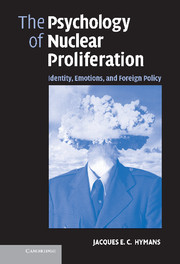Book contents
- Frontmatter
- Contents
- List of figures
- List of tables
- Preface
- List of acronyms and abbreviations
- 1 Introduction: life in a nuclear-capable crowd
- 2 Leaders' national identity conceptions and nuclear choices
- 3 Measuring leaders' national identity conceptions
- 4 The struggle over the bomb in the French Fourth Republic
- 5 Australia's search for security: nuclear umbrella, armament, or abolition?
- 6 Argentina's nuclear ambition – and restraint
- 7 “We have a big bomb now”: India's nuclear U-turn
- 8 Conclusion: lessons for policy
- Appendix: Coding rules and results
- Bibliography
- Name index
- Subject index
Appendix: Coding rules and results
Published online by Cambridge University Press: 22 September 2009
- Frontmatter
- Contents
- List of figures
- List of tables
- Preface
- List of acronyms and abbreviations
- 1 Introduction: life in a nuclear-capable crowd
- 2 Leaders' national identity conceptions and nuclear choices
- 3 Measuring leaders' national identity conceptions
- 4 The struggle over the bomb in the French Fourth Republic
- 5 Australia's search for security: nuclear umbrella, armament, or abolition?
- 6 Argentina's nuclear ambition – and restraint
- 7 “We have a big bomb now”: India's nuclear U-turn
- 8 Conclusion: lessons for policy
- Appendix: Coding rules and results
- Bibliography
- Name index
- Subject index
Summary
Coding rules
A. General rules for all codings
The basic unit of measurement is the paragraph.
The coding of one paragraph should not impact the coding of subsequent paragraphs.
The coding must be based on the explicit language of the text.
Statements in past, present, and future tense are coded equivalently. However, in the case of tension between statements about the long term and statements about the current state of affairs, the former are given priority.
B. Coding for references to external actors
We are looking for references to external actors. An external actor is defined as any human community (or set of communities) that is not primarily based inside the territory we claim as our national boundaries. [Examples of such human communities would include states or peoples seeking a state (e.g., “France,” “the Palestinians”), collections of states (e.g., “The Free World,” “the Third World,” “baseball-playing nations”), wider geographical entities (e.g., “Asia,” “the Pacific Rim”)' wider cultural or civilizational entities (e.g., “The Arab World,” “Christendom”), and humanity as a whole (e.g., “the world,” “the international community”). In addition, we also count references to the scourge of “international terrorism.” Note that communities that are in part based in our territory are counted, e.g., if an American makes reference to “NATO.” More coding precisions are offered below.]
- Type
- Chapter
- Information
- The Psychology of Nuclear ProliferationIdentity, Emotions and Foreign Policy, pp. 229 - 235Publisher: Cambridge University PressPrint publication year: 2006



